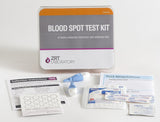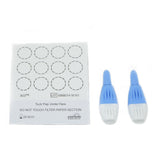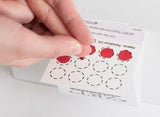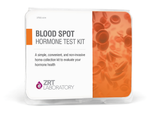Thyroxine Total (t4) Test is designed to test for Total Thyroxine (T4) hormone and accurately assesses T4 levels in the blood.
Thyroxine (T4) is the primary thyroid hormone circulating in the blood. Total T4 includes both free T4 and protein-bound T4 and, therefore represents the thyroid gland’s capacity to synthesise, process, and release T4 into the bloodstream. In contrast, free T4 and free T3 are representative of the bioavailability of active thyroid hormones in peripheral tissues. Therefore, a low level of total T4 with elevated levels of thyroid-stimulating hormone (TSH) and thyroglobulin suggests hypothyroidism caused by either low iodine intake or inhibition of iodine uptake or the iodination of thyroglobulin by goitrogens.
Excessive amounts of iodine can result in either hypo– or hyperthyroidism, depending on pre-existing conditions. For example, older people who have lived for an extended period in a low-iodine environment develop autonomous thyroid nodules as a compensatory mechanism to boost thyroid hormone production. When iodine exposure is suddenly increased, these nodules hyper-respond and the result is hyperthyroidism with high T4 production. On the other hand, hypothyroidism as a result of excess iodine can occur when iodine forms iodolipids within the thyroid follicle that inhibit the iodination of thyroglobulin, depressing T4 and T3 synthesis (the Wolff-Chaikoff effect). This can usually be reversed by lowering iodine intake to less excessive amounts so that thyroid hormone synthesis returns to normal. However, individuals with pre-existing subclinical hypothyroidism or Hashimoto’s disease may progress to a permanent clinical hypothyroid state and require thyroid hormone medication. The reference range for total T4 is 5—10.8 µg/dL.
Thyroid disease is much more common in women and often occurs under the age of 40. It also can run in families. You may need a thyroxine test if a family member has ever had thyroid disease or if you have symptoms of having too much thyroid hormone in your blood.
Common symptoms include:
- Tiredness
- Being sensitive to cold
- Weight gain
- Constipation
- Depression
- Slow movements and thoughts
- Muscle aches and weakness
- Muscle cramps
Test Result: You will receive your test result 3-5 working days after the laboratory receives your sample. You will see your hormone levels in graphics and numbers on your test results. You will also see laboratory comments by Hormone Specialist PhD Dr in the comments: you will find an analysis of your hormone levels and what to do next.
- Collect samples from the comfort of your home and post them to our lab.
- The test must be used within 12 months after the purchase date.
- The test kit includes a laboratory fee: no additional laboratory cost or tax.
- Customers are responsible for shipping their samples to the laboratory.
How does the test carry out?
This blood spot-based testing tool can be done in the privacy of your home. A simple step of collecting your blood spot for the test is required. Once you provide a blood spot, you need to seal the sample and send it off to us. Your test result report will be emailed to you between 3 and 5 working days after the laboratory receives your sample.
How to Use












